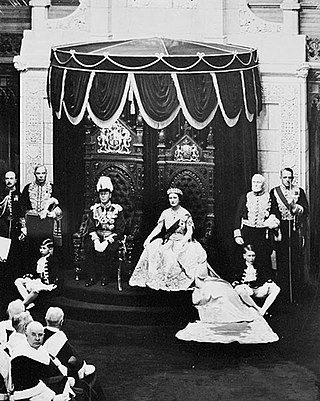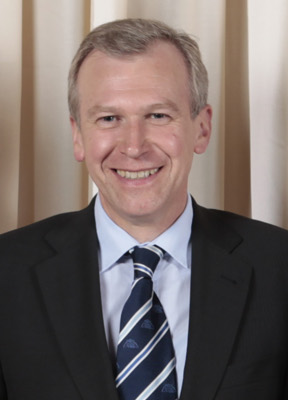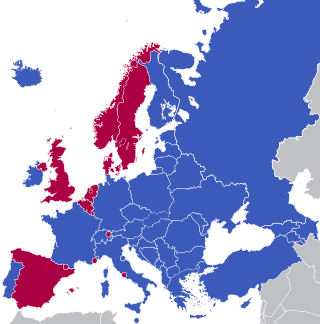
Leopold III was King of the Belgians from 23 February 1934 until his abdication on 16 July 1951. At the outbreak of World War II, Leopold tried to maintain Belgian neutrality, but after the German invasion in May 1940, he surrendered his country, earning him much hostility, both at home and abroad.

The monarchy of Belgium is the constitutional and hereditary institution of the monarchical head of state of Belgium. As a popular monarchy, the Belgian monarch uses the title king/queen of the Belgians and serves as the country's head of state and commander-in-chief of the Belgian Armed Forces.

The politics of Belgium take place in the framework of a federal, representative democratic, constitutional monarchy. The King of the Belgians is the head of state, and the prime minister of Belgium is the head of government, in a multi-party system. Executive power is exercised by the government. Federal legislative power is vested in both the government and the two chambers of parliament, the Senate and the Chamber of Representatives. The federation is made up of (language-based) communities and (territorial) regions. Philippe is the seventh and current King of the Belgians, having ascended the throne on 21 July 2013.

Royal assent is the method by which a monarch formally approves an act of the legislature, either directly or through an official acting on the monarch's behalf. In some jurisdictions, royal assent is equivalent to promulgation, while in others that is a separate step. Under a modern constitutional monarchy, royal assent is considered little more than a formality. Even in nations such as the United Kingdom, Norway, the Netherlands, Liechtenstein and Monaco which still, in theory, permit their monarch to withhold assent to laws, the monarch almost never does so, except in a dire political emergency or on advice of government. While the power to veto by withholding royal assent was once exercised often by European monarchs, such an occurrence has been very rare since the eighteenth century.

Paul-Henri Charles Spaak was an influential Belgian Socialist politician, diplomat and statesman who thrice served as the prime minister of Belgium and later as the second secretary general of NATO. Along with Robert Schuman, Alcide De Gasperi and Konrad Adenauer, he was a leader in the formation of the institutions that evolved into the European Union.
In a parliamentary or semi-presidential system of government, a reserve power, also known as discretionary power, is a power that may be exercised by the head of state without the approval of another branch or part of the government. Unlike in a presidential system of government, the head of state is generally constrained by the cabinet or the legislature in a parliamentary system, and most reserve powers are usable only in certain exceptional circumstances.

The prime minister of Belgium or the premier of Belgium is the head of the federal government of Belgium, and the most powerful person in Belgian politics.
Minister of state is a designation for a government minister, with varying meanings in different jurisdictions. In a number of European countries, the title is given as an honorific conferring a higher rank, often bestowed upon senior ministers. In the United Kingdom and several other Commonwealth countries, "minister of state" is a junior rank subordinate to ministers of higher rank. In Brazil and Japan, all ministers of cabinet rank hold the title, while in Australia "minister of state" is the designation applied to all government ministers regardless of rank.

The president of the European Council is the person presiding over and driving forward the work of the European Council on the world stage. This institution comprises the college of heads of state or government of EU member states as well as the president of the European Commission, and provides political direction to the European Union (EU).

Yves Camille Désiré Leterme is a Belgian politician, a leader of the Christian Democratic and Flemish party (CD&V). He was the prime minister of Belgium from March 2008 to December 2008, and later from November 2009 to December 2011.

The Council of State is a constitutionally established advisory body in the Netherlands to the government and States General that officially consists of members of the royal family and Crown-appointed members generally having political, commercial, diplomatic or military experience. It was founded in 1531, making it one of the world's oldest still-functioning state organisations.

The Federal Government of Belgium exercises executive power in the Kingdom of Belgium. It consists of ministers and secretary of state drawn from the political parties which form the governing coalition. The federal government is led by the prime minister of Belgium, and ministers lead ministries of the government. Ministers together form the Council of Ministers, which is the supreme executive organ of the government.

In the European history, monarchy was the prevalent form of government throughout the Middle Ages, only occasionally competing with communalism, notably in the case of the maritime republics and the Swiss Confederacy.

Herman Achille, Count Van Rompuy is a Belgian politician who served as prime minister of Belgium from 2008 to 2009, and then as the first permanent president of the European Council from 2009 to 2014.
The 2007–2008 Belgian government formation followed the general election of 10 June 2007, and comprised a period of negotiation in which the Flemish parties Flemish Liberal Democratic, Christian Democratic and Flemish (CD&V) and New Flemish Alliance (N-VA), and the French-speaking parties Reformist Movement (MR), Democratic Front of Francophones (FDF) and Humanist Democratic Centre (CdH) negotiated to form a government coalition. The negotiations were characterized by the disagreement between the Dutch- and French-speaking parties about the need for and nature of a constitutional reform. According to some, this political conflict could have led to a partition of Belgium.
The 2007–2011 Belgian political crisis was a period of tense communal relations and political instability in Belgium, which was rooted in the differing opinions on state reform, and in the continued existence of the controversial electoral district of Brussels-Halle-Vilvoorde (BHV). Parties from the Dutch-speaking Flemish Community are in general strongly in favour for a devolution of powers to the communities and regions, and the splitting of the unconstitutional BHV district, while French-speaking French Community of Belgium is generally in favour of retaining the status quo. After the 2010 elections, the topics of public debt, deficit cuts and socio-economic reform were added to the debate, with most Flemish parties in favour of finding money by strongly reducing spending, whilst the proposals supported by most French-speaking parties also included a significant raise in taxes. The crisis came to an end in December 2011 with the inauguration of a new federal government which agreed on partition of the BHV district and on policies aimed at tackling the economic downturn. The country's continuing linguistic divide played a large part in the crisis. Several times during the period Belgium was threatened to be split up amid rising Flemish separatism.
The Van Rompuy Government was the federal government of Belgium from 30 December 2008 until 15 November 2009. Herman Van Rompuy was nominated as the first President of the European Council and resigned shortly after as Premier. It took office when the Flemish Christian Democrat Herman Van Rompuy was sworn in as Prime Minister after the Leterme I Government fell on 22 December 2008.
The Minister of State is an honorary title in Belgium. It is formally granted by the Belgian monarch, but on the initiative of the Belgian federal government. It is given on a personal basis, for life rather than for a specified period. The title is granted for exceptional merits, generally to senior politicians at the end of their party careers. It is not lost after a criminal conviction. Ministers of state are often former cabinet members or party leaders. Ministers of State advise the Sovereign in delicate situations, with moral authority but without formal competence. They are also members of the Crown Council of Belgium.

Belgium–Congo relations refers to relations between the Kingdom of Belgium and the Democratic Republic of the Congo. The relationship started with the exploration of the Congo River by Henry Morton Stanley.

Franciskus Romanus Rumoldus, Baron van Daele is a Belgian diplomat who served as the private secretary of His Majesty's Cabinet.













